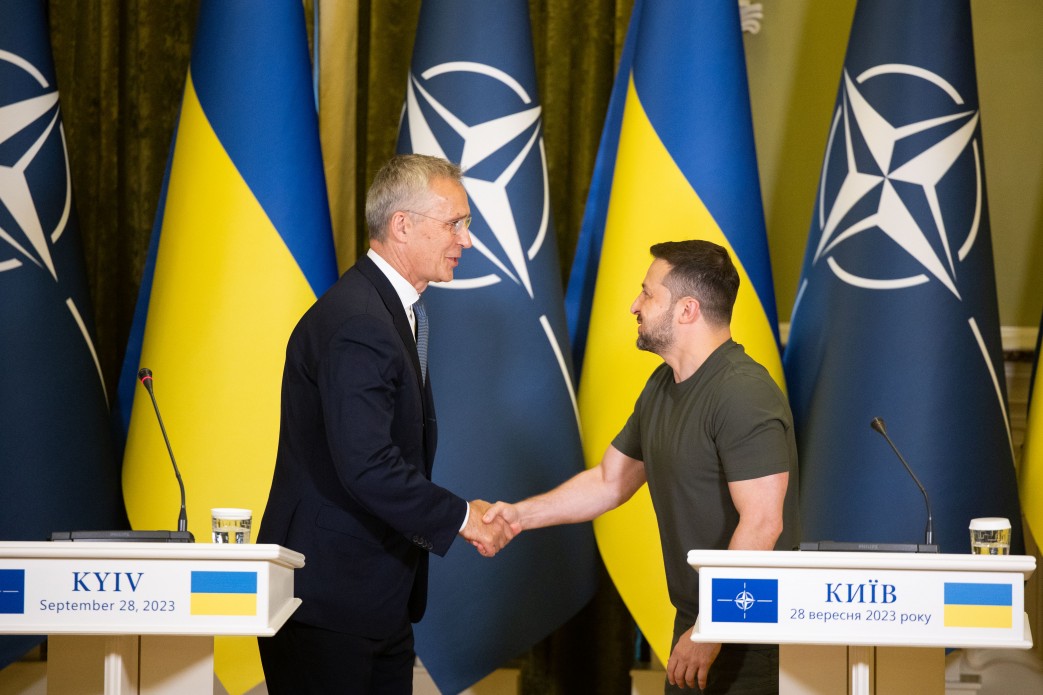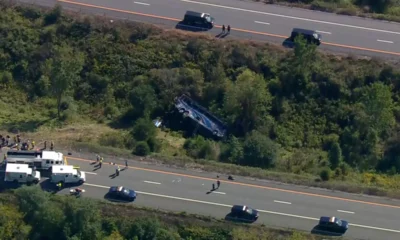Politics
NATO Secretary-General and UK Defense Minister Visit Ukraine Amid Ongoing Conflict

NATO Secretary-General Jens Stoltenberg has made his second visit to Ukraine since the onset of the Russian offensive in February 2022. The Norwegian official met with Ukrainian President Volodymyr Zelenskyj in Kyiv. For security reasons, the meeting was initially kept confidential. Stoltenberg’s first visit to Ukraine after the conflict began was on April 20th of this year.
During a joint press conference, Zelenskyj stated that it’s “only a matter of time” before Ukraine becomes a member of the Alliance. “We are doing everything to approach that moment,” he added.
In a related development, the new British Defense Minister, Grant Shapps, during his inaugural visit to Ukraine, reassured President Wolodymyr Selenskyj of continued UK support. “We will tirelessly work to bring our partners together to help Ukraine counter Putin’s illegal invasion,” Shapps posted on X (formerly Twitter). Zelenskyj emphasized the importance of bolstering air defense, especially in light of potential Russian airstrikes against the country’s energy infrastructure in the upcoming winter. Shapps conveyed that the UK is aiding Ukraine in liberating its occupied territories and that he is in Kyiv to understand what is further needed for victory.
Additionally, French Defense Minister Sébastien Lecornu is also reportedly set to visit Kyiv to meet his counterpart, Rustem Umjerow. He is expected to be accompanied by defense industry professionals.
News
Nagorno-Karabakh Announces Dissolution Amidst Tensions with Azerbaijan

Nagorno-Karabakh, an internationally unrecognized republic, has declared its dissolution effective January 1, 2024. Following a defeat by pro-Armenian forces against Azerbaijan, Nagorno-Karabakh’s government announced the termination of all its “state institutions and organizations,” effectively ceasing its existence.
The decision, signed by Prime Minister Samwel Shakhramanjan, was made in light of the severe political and military situation, aiming to protect the safety and lives of the Nagorno-Karabakh population. The dissolution was a part of the terms of surrender.
Nagorno-Karabakh, while legally a part of Azerbaijan, has a predominantly Armenian population. The region has been a point of contention between Azerbaijan and Armenia for years. A significant military offensive by Azerbaijan on September 19 led to the rapid defeat of pro-Armenian forces in Nagorno-Karabakh. This resulted in a mass exodus, with over 65,000 people, more than half of Nagorno-Karabakh’s population, fleeing to Armenia. Experts anticipate that nearly all Armenians living in Nagorno-Karabakh will leave the region, which had a recent population of 120,000.
Following the dissolution, residents will need to familiarize themselves with Azerbaijan’s laws regarding the region’s integration, allowing them to decide if they wish to return.
Meanwhile, satellite images reveal long traffic jams along the Latshin Corridor, the sole route from the remote mountainous region to Armenia. The Azerbaijani military, which had previously blocked the corridor, causing a humanitarian crisis in Nagorno-Karabakh, has now opened it for Armenians’ departure, albeit under strict surveillance. Notably, Azerbaijani authorities arrested Nagorno-Karabakh’s former Prime Minister, Ruben Wardanyan, at the border crossing. Azerbaijani media report that Wardanyan, once a businessman active in Russia, is now accused of financing terrorism among other charges.
Politics
Iran’s Uranium Enrichment: Iranian President Points to European Breach of Commitments

In a recent interview with CNN’s Fareed Zakaria, Iranian President Ebrahim Raisi defended Iran’s decision to enrich uranium to near weapons-grade levels. Raisi claims this move was a direct response to European nations not upholding their commitments under the 2015 nuclear agreement, known as the Joint Comprehensive Plan of Action (JCPOA).
Raisi stated, “In the beginning, we were not seeking 60% levels of enrichment. They (European states) trampled upon their commitments.” He emphasized that Iran’s actions were a counter-response to the perceived betrayal by the JCPOA signatories.
The international community raised eyebrows in 2021 when Iran announced its enrichment of uranium to 60%, especially after an attack on its Natanz nuclear facility, which Tehran attributes to Israel. This level of enrichment significantly reduces Iran’s “breakout time” to develop a nuclear weapon, which necessitates uranium enriched above 90%. For context, nuclear power, which Iran claims is the primary goal of its nuclear program, only requires uranium enrichment between 3% and 5%.
Further concerns arose when the International Atomic Energy Agency (IAEA) reported that Iran was the sole non-nuclear-armed nation enriching uranium to 60%. Additionally, in March, the IAEA discovered uranium particles enriched to 84% at Iran’s Fordow plant.
The Middle East’s geopolitical landscape could shift dramatically if Iran’s nuclear program isn’t adequately monitored. Saudi Arabia’s Crown Prince Mohammed bin Salman recently commented that if Iran obtains a nuclear weapon, Saudi Arabia would feel compelled to do the same.
However, Raisi firmly denies that Iran’s increased enrichment activities are a precursor to nuclear weapon development. He told CNN, “It was officially announced that the action we intend to take is not intended to reach nuclear weapons of any type or a military dimension of any type, but it is… a response for the lack of commitment demonstrated by the Europeans.”
The JCPOA, signed in 2015, was a landmark agreement between Iran and global powers, including the U.S. and the European Union. It aimed to limit Iran’s nuclear activities in exchange for sanctions relief. However, the U.S. exit from the deal in 2018 under President Donald Trump’s administration had cascading effects on European trade with Iran. Ali Vaez, Iran Project Director at the International Crisis Group, noted that approximately “80% of Europe’s trade with Iran evaporated almost overnight” post the U.S. withdrawal.
Efforts to bring both the U.S. and Iran back to the negotiation table have been ongoing since 2021, but a consensus remains elusive.
The future of the JCPOA and Iran’s nuclear ambitions remains uncertain, but one thing is clear: the international community will be watching closely.
News
Nagorno-Karabakh Crisis: Thousands of Ethnic Armenians Flee Amid Azerbaijan’s Advance

In the wake of Azerbaijan’s recent takeover of the disputed Nagorno-Karabakh region, thousands of ethnic Armenians are fleeing to neighboring Armenia. Reports suggest that over 13,000 individuals have already crossed into Armenia, with the potential for the number to rise significantly.
The 2020 ceasefire, brokered by Russia, seems to be faltering as Moscow faces criticism for failing to uphold its peacekeeping role. The Lachin Corridor, a vital highway connecting Stepanakert, the capital of Nagorno-Karabakh, to Armenia, has been blocked for almost a year and completely shut since mid-June. Kremlin spokesman Dmitry Peskov defended Russian peacekeepers, emphasizing their “real heroism” and commitment to their mandate.
A significant incident in Stepanakert involved an explosion at a petrol station, injuring over 200 people, as reported by local human rights ombudsman Gegham Stepanyan. The cause of the explosion remains unclear.
Armenia’s Prime Minister, Nikol Pashinyan, expressed concerns about potential “ethnic cleansing” in the region. In contrast, Azerbaijan has stated its intention to reintegrate ethnic Armenians as “equal citizens.”
U.S. state department spokesman Matthew Miller urged both sides to find a lasting peace agreement. Meanwhile, envoys from Armenia and Azerbaijan are set to engage in EU-backed talks in Brussels.
The situation remains tense, with many refugees expressing despair. “I gave my whole life to my homeland,” one man told the BBC. “It would be better if they killed me than this.”
Further developments are awaited as international communities monitor the situation closely.
-

 News2 years ago
News2 years agoHuawei’s Bold Move into AI: A New Era or Another Controversy?
-

 Lifestyle2 years ago
Lifestyle2 years agoApple’s Vision Pro: Setting New Standards in VR and AR Technology
-

 Tech2 years ago
Tech2 years agoThe Horizon of Innovation: The 10 Most Promising Future Technologies Shaping Our Tomorrow
-

 News2 years ago
News2 years agoTragic Bus Crash in New York Claims Two Lives; Multiple Students Injured
-

 News2 years ago
News2 years agoEscalation in Ukraine-Russia Conflict: Missile Strikes Target Key Installations in Crimea
-

 Politics2 years ago
Politics2 years agoPoland Halts Arms Shipments to Ukraine Amid Rising Tensions Over Grain Ban
-

 News2 years ago
News2 years agoHouse GOP Faces Deep Divisions Over Government Funding Ahead of Deadline
-

 Health2 years ago
Health2 years agoThe Placebo Effect: A Double-Edged Sword in Modern Medicine












